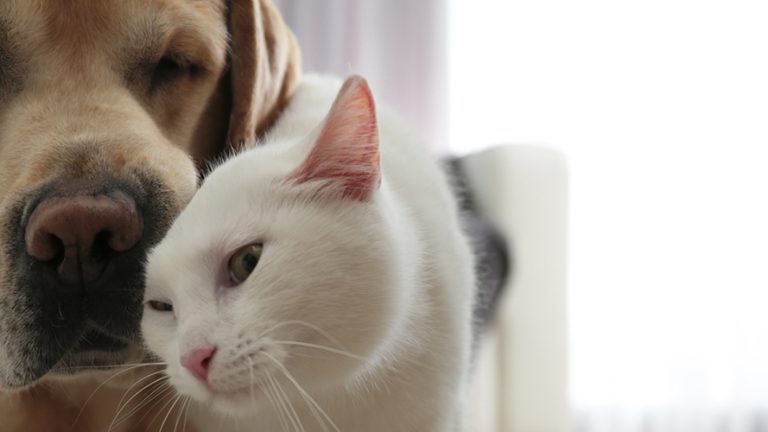Image: Adobe Stock - New Africa
A question most animal lovers have asked themselves at one time or another. By Richard M. Davidson, Professor of Old Testament Studies at Andrews University
Over the years, as a pastor and teacher, I have met many people who were mourning the loss of a beloved dog or cat. Some have asked me if their pets or other animals would one day be present at the resurrection. As a passionate animal lover, I had a close family relationship with some wonderful dogs and cats as a child. So of course this question also interests me personally. In teaching the sanctuary doctrine, I have often wondered how God will make amends for what was done to the countless innocent animals that were sacrificed at his command in the Old Testament. Here are some thoughts:
I haven't found any final answers, but I have found some exciting clues in the Bible. These give hope that at least some animals (including our pets and sacrificial animals) could be resurrected and saved for eternity. Among the intriguing biblical texts (and other inspired statements) are the following:
Psalm 36:6 confirms: "You, O LORD, save people and animals." (SLT). Although many versions translate "help" instead of "save," the Hebrew uses the word that is used elsewhere in Scripture for eternal salvation.
Micah 4:8 speaks of the restoration of the "former dominion" at the end of time. The former dominion that Adam and Eve lost was the dominion over the animals (Genesis 1:28). The book of Revelation clearly speaks of the saints in heaven as kings and queens (20:4; 5:10; 22:5). This naturally raises the question: over whom will all the saints reign if they will be kings and queens? It seems plausible that we will reign over the animal kingdom - as in the Garden of Eden.
The Bible clearly states that animals are very close to God's heart. The book of Jonah ends with God's concern for the animals of Nineveh. "Shall not Nineveh, a city so great, in which there are more than a hundred and twenty thousand people ... and many animals?" (Jonah 4:11) Genesis 9:10 and Hosea 2:18 speak of God making a covenant with the animals. The Old Testament says that the Sabbath is not only for man, but also that animals should rest on it (Exodus 23:12). Exodus 22 is fascinating: the LORD opens the mouth of Balaam's donkey, who speaks to her master. It does not say here that God gave the donkey intelligence and speech. No, he opened "her mouth" and she spoke! Then the angel asks Balaam the penetrating question: "Why have you beaten your donkey?" (verse 32) God was concerned that an animal was being cruelly mistreated! My daughter, Rahel Schafer, recently defended her doctoral thesis. In it, she looked at the many other passages in which the animals speak and even cry out to God, and God responds to their cry!1 (See, for example, Job 12:7-9; 40:15-19; 41:10; Psalm 104:20, 26, 27; and Isaiah 43:20.
God's frequently expressed concern for animals in the Old Testament fits with the instructive verse that Jesus said in the New Testament: "Are not five sparrows sold for two pennies? Yet not one of them is forgotten before God." (Luke 16:4)
When God remembers something in the Bible, it means that he acts in favor of someone or something (see Genesis 8:1, where God remembered Noah and the animals in the ark when he saved them from death). If God does not "forget" the sparrows that fall (die), does this not mean that he "remembers" them, i.e. acts in favor of the fallen - saves them? (Matthew 10:29)
Romans 8:19-21 describes how the whole creation groans and travails, waiting for restoration: "For the whole creation ... was subjected to futility. This was done against its will by him who subjected it. But the whole creation hopes for the day when it will be set free from death and corruption into the glorious freedom of the children of God." (NL) Could these verses perhaps be an indication that even God's earthly creatures, who are not human and have no responsibility for evil, will eventually be freed from decay/curse through resurrection/salvation?
I find Ellen G. White's comments fascinating, where she speaks of the affection and faithful qualities of animals: "The intelligence displayed by many dumb animals is so close to human intelligence that it amounts to a mystery. Animals see, hear and love, they fear and suffer. They use their organs far more naturally than many humans. They show compassion and sensitivity towards their suffering companions. Many animals show a love for their caretakers that far exceeds the affection of some humans. They form relationships with humans, the dissolution of which means great suffering for them. "2
A multitude of recent studies on animal behavior, intelligence and emotions support this statement.3 Aren't love and trust in these animals exactly the qualities God is looking for in his human followers, qualities they need for heaven? If animals possess such qualities, are they not also suitable for heaven?
C. S. Lewis believed that especially pets and others that have a "soul life" and have developed positive qualities such as love and trust will be present at the resurrection.4 What Lewis did not realize is that the Bible calls all animals "souls" or "persons" just like humans (Genesis 1:20, 21, 24, 30; 9:10, etc.).
In his multi-volume allegory about the plan of redemption, The Chronicles of Narnia, Lewis deals with the ability of animals to speak. The Bible seems to agree with him: Psalm 148 includes "beasts and all cattle; creeping things and birds" (vs. 10) among the creatures that praise the LORD. Revelation 5:13 says: "And I heard every creature which is in heaven, and on earth, and under the earth, and in the sea, and all that in them is, saying, To him that sitteth upon the throne, and to the Lamb, be praise and honor and glory and power for ever and ever."
The language of Psalm 104:24-30 could point to an eschatological resurrection of fish, birds and land animals. S. R. Driver writes: "Few if any readers of the Old Testament seem to have noticed that the text, if one does not wish to do violence to it in interpretation, proclaims the strange doctrine of a resurrection not only of man and birds and beasts, but also of Leviathan and the teeming things, or rather of the 'gliding things without number' that swim in the sea." (Ps. Civ. 5 10-30).5 Driver emphasizes that the "all of them" (verse 27) who "are created" (verse 30) refers to "all God's creatures, not just some of them, to all those mentioned in the psalm, whether man, beast, bird or fish. "6... Although Driver accepts the text as it stands, he takes offense at this meaning and therefore proposes a radical deletion of the text. But if one accepts the text as it is, which I think is the best position, then this passage seems to point to the resurrection of a multitude of animals.
I am not suggesting that the above evidence is definitive. They are implied at best. But there are enough such "hints" in the inspired sources that we don't need to tell our children that when their pets die, they will never see them again. For children who may have been intimately involved with their pet all their lives, this could unnecessarily cast God's character in a bad light. So why suggest that the animal will not be resurrected? Instead, I suggest that parents tell their children when a pet dies, "If you go to heaven and want your pet there, God will surely fulfill your heart's desire." We can give this answer without hesitation, because Scripture says: "Delight yourself in the LORD, and he will give you the desires of your heart!" (Psalm 37:4) But if the animals are not resurrected, then we will not desire them in our immortal state. Paul's promise in 1 Corinthians 2:9 hits the nail on the head: "Eye hath not seen, nor ear heard, neither have entered into the heart of man, the things which God hath prepared for them that love him." (1 Corinthians 2:9) So why shouldn't we imagine the resurrection of our pets and other animals as the fulfillment of this promise?
I think that a resurrection of the animals at the end of the great battle between Christ and Satan is fitting, when God finally puts everything right. When I think of all the innocent animals that have suffered at the hands of cruel people and for Satan's pleasure, I become convinced that God can hardly wait to make amends for this part of Satan's work. Let us also think of all the innocent victims of the divinely ordained Old Testament ceremonial system, which symbolically revealed to us the horror of sin and its disastrous consequences and pointed to the coming of God's Lamb. I cannot imagine that God would have allowed all this divinely ordained innocent suffering without finally "remembering" those who suffered by saving/resurrecting them!
I am not "dog "matical about this suggestion. God may have another way to solve this problem that goes far beyond what I am imagining now! God will do what is best. One day we will experience it when we (and our pets and other animals?) see him face to face in heaven! On that day, "there will be no more death; there will be no more mourning, crying or pain; the first things have passed away!" (Revelation 21:4).
Translated with kind permission of the author from:
https://www.perspectivedigest.org/archive/22-2/the-salvation-of-animals
Footnotes:
1 A. Rahel Schafer, "'You, YHWH, Save Humans and Animals': God's Response to the Vocalized Needs of Non-human Animals as Portrayed in the Old Testament" (Doctoral dissertation, Wheaton College, 2015).
2 The Ministry of Healing, 315, 316.
3 See, for example, Vint Virga, The Soul of All Living Creatures: What Animals Can Teach Us About Being Human (New York: Broadway, 2014); Virginia Morell, Animals Wise: How We Know Animals Think and Feel (New York: Broadway, 2014)
4 C. S. Lewis, The Problem of Pain (New York: Macmillan, 1962), 129-143.
5 See G. R. Driver, "The Resurrection of Marine and Terrestrial Creatures," Journal of Semitic Studies 7:1 (Spring 1962): 12.
6 Ibid, 17.
Source: hoffnung-weltweit.info

































